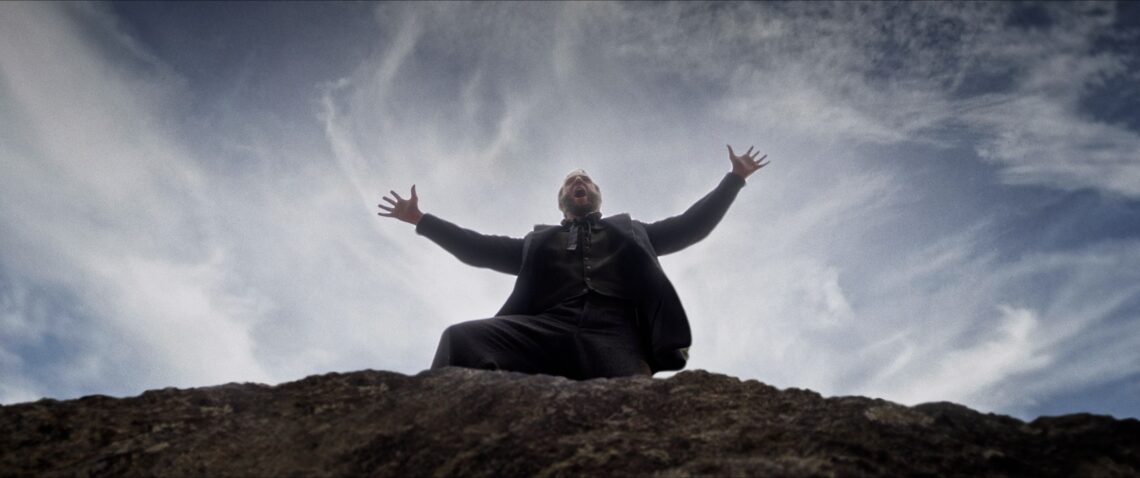Exploring the eerie depths of “Thine Ears Shall Bleed”: A supernatural journey through the American frontier
A new frontier in horror
Mysterious are the ways of the Lord, but devious those of His opposite number in “Thine Ears Shall Bleed.” This enterprising first feature from Ben Bigelow recalls “The Witch” in placing another pious pioneer family at the mercy of the elements — and apparent occult forces — during an early chapter of American history. The command of atmospheric tension Robert Eggers demonstrated in his own debut is not much evidenced here, making for a middling supernatural drama that’s never terribly convincing, or scary. Nonetheless, it’s an indie sufficiently polished to attract viewers looking for offbeat genre fare that’s relatively restrained in graphic horror content. It releases to U.S. digital platforms July 9, with the U.K. following on the 15th.
A journey into the unknown
Though time and place go unspecified onscreen, we’re somewhere around the 1860s in Montana locations. Rev. Ezekiel Thatcher (Andrew Hovelson), wife Sarah (Hannah Cabell), daughter Abigail (Lea Zawada), and son Luke (Duke Huston) are riding a covered wagon through high forests in order to retrieve a pipe organ the minister hopes will increase his flock. A fork in the road appears, albeit not on their map. They go to the right, choosing both the direction more conspicuously traveled and the suggested path of righteousness.
Unfortunately, things soon start feeling wrong. When this route dead-ends, they camp overnight rather than turn around immediately; once morning arrives, their horses have vanished. Strange noises strike them differently, stirring terror or sounding like “angels on high.” A thunderous din greets Ezekiel at a cliff overlook, producing the titular affliction. He recovers with a fervent belief that he’s “heard the voice of God in these woods.” Later something happens to Luke in the same place, miraculously granting sight to the hitherto blind teen.
The unraveling of faith
But their rapture fails to infect the womenfolk, who remain skeptical about the presumed godliness of being stranded in the wilderness without food or transport. Dad grows ever more irrational, even hostile when reminded of his family’s plight. On a solo hunting and scouting expedition, mom is alarmed to discover myriad signs that they’ve stumbled into some kind of maze-like trap without an exit. It is moderately reassuring at first when Luke runs across distraught botanist Woodrow (Lucas Near-Verbrugghe) — another person who got lost here after taking the now-vanished fork in the road. But as individual madnesses and inexplicable occurrences keep escalating, this fellow traveler may prove to be something other than it appears, too.
A period piece with a twist
Ben and William Bigelow’s screenplay is something of a “Blair Witch Project” in period drag, without the found-footage angle or aesthetic. Satanic symbols begin cropping up, placed by invisible hands; discord is sown that turns the protagonists against one another. Woodrow recalls a Blackfoot legend warning of a demon lurking hereabouts that seeks a “pure and perfect vessel” as its conduit into the wider world, out of this enchanted stomping ground.
Needless to say, fate is calamitously unkind to nearly everyone here in the end. There would be more potency to that progress if the film were less verbose, and more artful use were made of the settings in southwestern Montana’s Bitterroot Valley. Chris Cavanaugh’s widescreen photography is attractive enough, but “Thine Ears Shall Bleed” would certainly benefit from a look emphasizing the sinister over the scenic. Nor does director-editor Bigelow show any great flair for building tension, overall or in would-be setpieces. Bursts of loud sound (seldom a laudable strategy in horror) rep the most notable attempts at jolting viewers here. While pacing isn’t exactly dull, it never quite pulls taut. Performances are variable — one suspects they’d be just fine if the movie supported its characters’ eventual hysterics with a moodier, more claustrophobic style, while unburdening their actors of too much stilted dialogue.
A reflective closure
Still, the conceptual mix of misguided religious fervor and diabolical predation in an American West of 160 years ago or so keeps the enterprise reasonably compelling. It’s always interesting to see familiar genre tropes deployed through the lens of an epoch underrepresented onscreen. While Bigelow’s vision isn’t as inspired as one might ideally like, it does earn credit for not taking the road-fork that leads to jump scares and other stock devices dominating a majority of franchise-heavy horror at present.
For those intrigued by the premise, you can watch the trailer and find more information about “Thine Ears Shall Bleed” here.

 Italian
Italian







